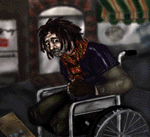


he next day was bright, cold and very clear. Shirley took Leslie to the Portobello market, while her father searched for some news of Jeanette. The head of the British office for Jeanette's bureau had not heard from her in four days. He too was concerned.
"Her next report isn't due until tomorrow, then she's off for the holiday. So officially, I'm not concerned until then, but she normally checks in quite frequently. Conditions are very bad-most of the country's communications, if they existed in the first place, have been knocked out by the weather. I've got two other correspondents in the same region and I haven't heard from them either, so the silence doesn't necessarily mean anything."
"Are you concerned?"
"I rather hate to tell you this, but yes, very much so. This is a very rugged country. The weather is beastly at the moment and... well, I'm sure you've seen the news. The place is chock full of land mines and there are a lot of extremists who have their own unique ideas on how the peace process should unfold. I'm afraid that the modern journalist has become a handy political pawn, so there is a risk. I wish I could say otherwise, but..."
 Leslie thought the market was fabulous. There was a large open-air market in Seattle and she always
loved going: the press of people, the smells and the furious colors always made her feel good. She
didn't know better how to describe it. She just felt good when she was there. The Portobello made
the Pike Place market back home seem like a little child's version. This was immense. The twisty old
cobblestone alleys were crammed full of unimaginable surprises: antique stores, spice shops, coffee
houses and junk heaps all vied for her attention. One marvelous enterprise was full of wooden
Balinese gods and spirits, all flying from the ceiling. Another held the most delightful hand-carved
cats. She bought one as a Christmas present for her mother, it was an exact match of the family cat
back home, a tortoise shell tabby named Blanche. Shirley was quite indulgent, allowing Leslie to
move at her own pace and with her own agenda. For lunch they ate fiery Malaysian food at a
restaurant owned by a friend of Shirley's. The eatery overflowed with customers. Leslie held
Shirley's hand and wolfed down a plate of spicy noodles until her lips where numb and her nose
ran.
Leslie thought the market was fabulous. There was a large open-air market in Seattle and she always
loved going: the press of people, the smells and the furious colors always made her feel good. She
didn't know better how to describe it. She just felt good when she was there. The Portobello made
the Pike Place market back home seem like a little child's version. This was immense. The twisty old
cobblestone alleys were crammed full of unimaginable surprises: antique stores, spice shops, coffee
houses and junk heaps all vied for her attention. One marvelous enterprise was full of wooden
Balinese gods and spirits, all flying from the ceiling. Another held the most delightful hand-carved
cats. She bought one as a Christmas present for her mother, it was an exact match of the family cat
back home, a tortoise shell tabby named Blanche. Shirley was quite indulgent, allowing Leslie to
move at her own pace and with her own agenda. For lunch they ate fiery Malaysian food at a
restaurant owned by a friend of Shirley's. The eatery overflowed with customers. Leslie held
Shirley's hand and wolfed down a plate of spicy noodles until her lips where numb and her nose
ran.
As they were leaving, they almost fell over a man in a wheelchair who had parked himself outside the front door. He was dressed in a wild assortment of clothes and cast-offs which looked like it had been culled from the trash cans of every stall in market. His long brown hair was knit up into a series of thick woolly dreadlocks which made his head look like a giant spider. He held a small, flat cardboard box with a sign taped to it. The bottom of the box was littered with change. Leslie realized he had no legs. Shirley, guiding Leslie by the elbow, maneuvered them past him with a curt, "Hello."
Sensing Shirley's tension, Leslie asked, "Who was that man?"
"Just another veteran who thinks the world owes him a living."
Leslie tried to understand this reply.
"But he didn't have any legs."
"Yes that's right. Lots of people without legs can still manage to work."
"What happened to him?"
"Hurt in a war, I suppose."
"Which one?"
"Which war? Oh, I don't know. One of them."
"Mommy's war?"
"Mommy's war." Shirley stopped and looked at Leslie. "I don't think it was the same one as your mother's."
"I'd like to give him some money."
"You know. I'm a silly old bat, aren't I? You're right. It's Christmas. You go give him some money if you want to. As a matter of fact, here, give him a pound for me and tell him the silly old bat says,'God Bless'."
©1995 Hyperbole Studios Inc.